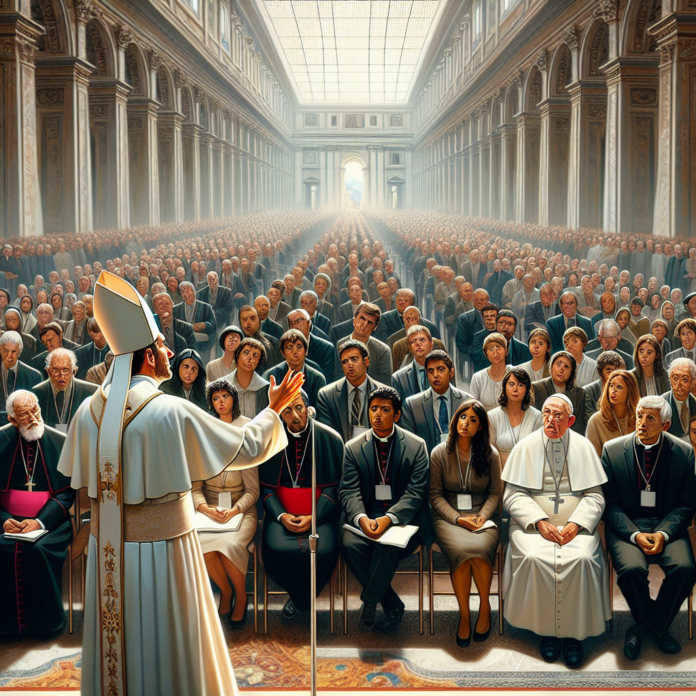Synod on Synodality: Pope Francis Invites Broader Lay Participation in Church Governance
In a historic move that underscores his vision for a more inclusive and dynamic Catholic Church, Pope Francis has inaugurated the Synod on Synodality, a two-year, unprecedented global consultation process aimed at transforming the way the Church makes decisions. With a theme of "For a Synodal Church: Communion, Participation, and Mission," this synod seeks to listen to and engage members of the Church at every level, fostering a culture of dialogue and inclusiveness.
Launched in 2021, the Synod on Synodality represents a significant departure from traditional Church governance, which has often been criticized for its hierarchical nature and exclusion of lay voices in decision-making processes. The initiative marks a definitive step in Pope Francis’ effort to reshape the ecclesiastical structure to better reflect the diverse composition of the global Church, including laypeople, women, and marginalized communities.
A Call for Active Participation
"The Church is called to be the house of all, and the synodal process invites everyone to play an active role," Pope Francis stated in his opening address. His words articulate a sweeping vision of unity and engagement, urging the faithful to embrace dialogue and discernment as key components of ecclesial life. The synod aims to cultivate a Church where decisions are made collectively, informed by the experiences and insights of all believers, rather than exclusively by clergy.
Under this initiative, dioceses across the world have been asked to undertake comprehensive consultations aimed at understanding the aspirations and challenges faced by their communities. This involves a series of listening sessions conducted at the parish level, guided by surveys and dialogues designed to capture a broad spectrum of perspectives.
Empowering the Laity
One of the most groundbreaking aspects of the Synod on Synodality is its focus on empowering the laity. Traditionally, the laity’s role in the Church has been limited, largely confined to participation in liturgical and volunteer activities. However, this synod recognizes the vital contributions laypeople can make in shaping the Church’s path forward, especially in areas like social justice, environmental issues, and community outreach.
For many Catholics, particularly younger generations, this represents a momentous opportunity to have their voices heard. Rosemarie Johnston, a youth leader from Boston, describes the synod as a "game-changer" for young Catholics eager to participate in meaningful ways. "For too long, young people have felt disconnected from the Church’s decision-making process. This synod is our chance to engage and help steer the Church in a way that reflects our commitment to values like empathy, diversity, and environmental stewardship," Johnston said.
A Path Toward Greater Inclusivity
In addition to engaging the laity, the Synod on Synodality seeks to address issues of gender equality and the participation of women in the Church. Pope Francis has been vocal about the need for greater female involvement, suggesting that the Church cannot fulfill its mission without harnessing the talents and insights of women.
Throughout the synodal process, women’s voices are not only being solicited but prioritized, with a call for their increased involvement in roles of authority and decision-making within the Church. Dr. Mary M. Amore, a renowned theologian and advocate for women’s roles in the Church, expressed optimism about the synodal process. "By opening the doors to more inclusive participation, the Church is acknowledging that the wisdom and leadership of women are invaluable to its future," she noted.
Challenges and Hopes
Despite the potential for positive change, the Synod on Synodality is not without challenges. The process must navigate diverse opinions and cultural contexts within the Church’s global body. Moreover, there is skepticism from some quarters about whether the synod will result in tangible changes or remain a symbolic gesture.
However, the synodal process’s bottom-up approach suggests a commitment to meaningful transformation. The engagement of laypeople, clerics, and theologians in honest dialogue presents an opportunity to bridge divides and overcome polarization, fostering a sense of collective responsibility for the Church’s future.
Esteemed church historian and commentator Massimo Faggioli remarked, "This synod could be a watershed moment in ecclesiastical history. It’s a bold experiment in democratization within the Church, and its success will depend on genuine listening and a willingness to act on the insights gathered."
Looking Ahead
As the Synod on Synodality progresses, its outcome remains uncertain. Yet, its very inception marks a pivotal moment in the Catholic Church’s journey toward becoming a truly synodal body. By inviting the voices of all its members and promoting a culture of co-responsibility, Pope Francis is paving the way for a Church that mirrors the synodal ethos: communion, participation, and mission.
In the words of Pope Francis, "Let us not remain on the threshold, but enter in a spirit of faith and openness. May this synodal process be a journey of healing guided by the Spirit, rooted in hope and service." As the Church moves forward, the world watches with anticipation, hopeful for a future where every voice finds a place in the grand tapestry of faith.
